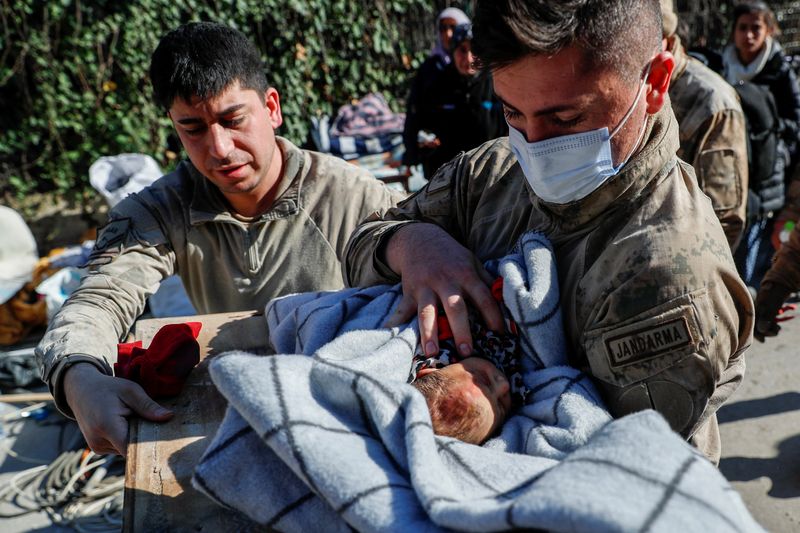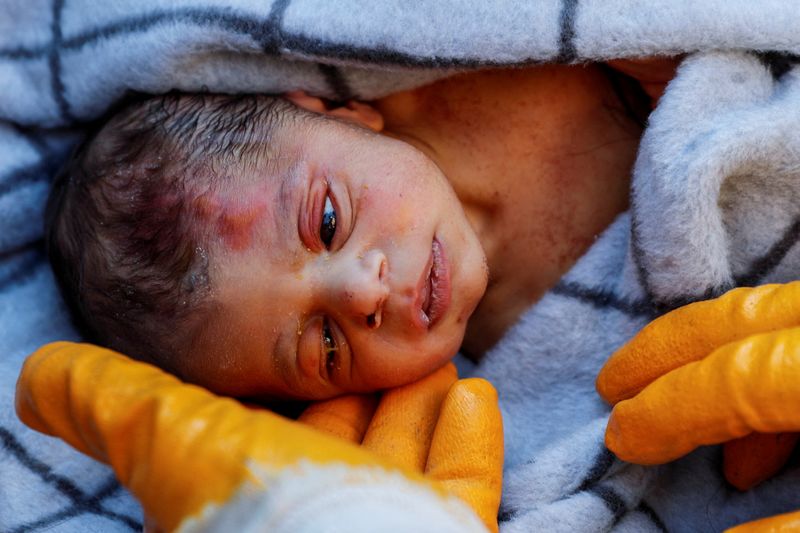ANTAKYA, Turkey (Reuters) - Crouched under concrete slabs and whispering "inshallah" (God willing), rescuers carefully reached into the rubble, then passed down the line their prize - a 10-day-old newborn who survived four days with his mother in the collapsed building.
His eyes wide open, Turkish baby Yagiz Ulas was wrapped in a shiny thermal blanket and carried to a field medical centre in Samandag, Hatay province, on Friday. Emergency workers also carried his mother, dazed and pale but conscious, on a stretcher, video images from Turkey's disaster agency showed.
The rescue of small children has lifted the spirits of weary crews searching for survivors on the fifth day after a major earthquake struck Turkey and neighbouring Syria, killing more than 22,000 people.
At least nine children were rescued on Friday, videos released by disaster services showed, their astonishing survival inspiring search crews who also saved several trapped adults.
The rescuers, including specialist teams from dozens of countries, toiled through the night in the ruins of thousands of wrecked buildings. In freezing temperatures, they regularly called for silence as they listened for any sound of life from mangled concrete mounds.
In the Turkish town of Kahramanmaras, 200 km (125 miles) north of Samandag, orange-clad workers squeezed into an air pocket beneath a fallen building to find a toddler, crying as dust fell into his eyes, before relief settled over him and rescuers gently brushed his face clean, video from the Turkish defence ministry showed.
Further to the east, the fearful face of another boy looked out from a pancaked building, his cries rising above the sound of the drills and grinders trying to free him on Friday morning in the Kurdish-majority city of Diyarbakir, where the 7.8 magnitude earthquake and aftershocks turned apartment blocks into mounds of rubble and piles of shattered masonry,
After opening a wider hole, workers placed an oxygen mask on his face and carried him to safety. Like baby Yagiz, he was followed by his mother, on a stretcher, 103 hours after the earthquake struck.
In Nurdagi near Iskenderun, a Spanish rescuer said "I got him, I got him, let's go" as he pulled a whimpering two-year-old boy from a collapsed building.
A human chain of soldiers from the Spanish Military Emergencies Unit (UME) moved the boy, Muslim Saleh, to a heated tent, and minutes later pulled out his six-year-old sister, Elif, and then their mother, all alive and well.
"They did not need much treatment, just love, warmth, water and a little fruit," Aurelio Soto, a UME spokesman, said.
Across the border in Syria, rescuers from the White Helmets group used bare hands to dig through plaster and cement, the air clouded with thick dust, until reaching the bare foot of a young girl, wearing pink pyjamas now grimy from days trapped, but alive and free at last.
A day earlier in the Syrian city of Azaz, Jomaa Biazid was reunited with his 18-month-old son Ibrahim, who he had not seen since the quake destroyed the family home, killing his wife and daughter.

Rescuers had found the boy in the rubble and taken him to hospital, where a couple posted images of him on social media hoping to track down any relatives.
Standing in tears with scars and blood stains on his face, Biazid looked stunned as his son called out to him "Baba" ("Dad"). He then rushed forward to give the boy a kiss. Biazid said he was still looking for his other son, Mustafa.
